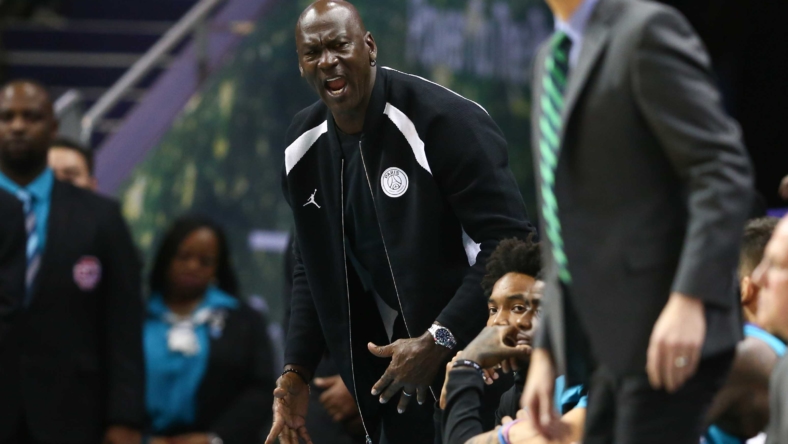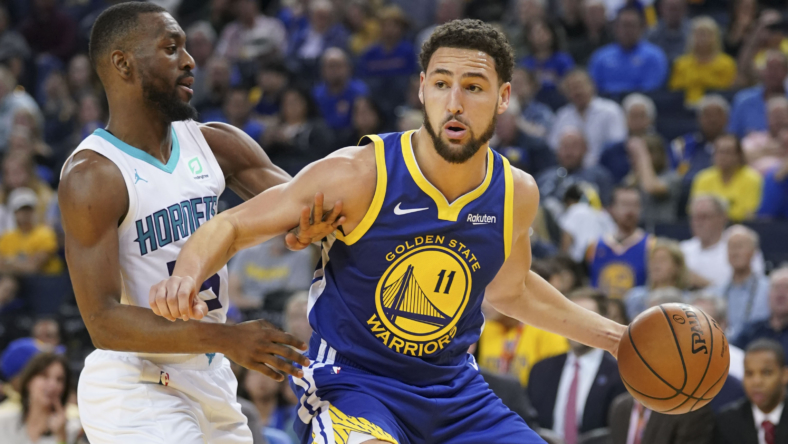
When Michael Jordan purchased the Charlotte Hornets, then the Bobcats, for $275 million in 2010, he was instantly the most famous NBA owner of all time and only the second Black owner in NBA history. The second feat was more important than the first, as it’s hard for the typically older, white-collar, and wealthy white aristocracy to top the greatest basketball player of all time in notoriety.
Jordan succeeded Charlotte’s previous owner, BET co-founder Robert Johnson, who bought the team in 2003. Jordan became the team’s minority owner shortly after retiring from his Hall of Fame playing career in 2006 before buying enough shares to earn the majority four years later. ESPN’s Adrian Wojnarowski reported Thursday night Jordan is in discussions to sell a controlling portion of the franchise to an ownership group led by Rick Schnall, a minority owner of the Atlanta Hawks, and Gabe Plotkin, a minority owner of the Hornets.
That Michael Jordan was the only Black majority owner of an NBA team was a feat worth celebrating. The league has desperately needed more minority ownership, especially African-American, as the league’s players are overwhelmingly Black.
On the minority ownership front, former player Grant Hill is part of the Atlanta Hawks’ new ownership group, Dwayne Wade is part owner of the Utah Jazz, Will Smith and Jad Pinkett Smith are part owners of the Philadelphia 76ers, and Hall of Famer Shaquille O’Neal is a minority owner of the Sacramento Kings. Only the Kings (Vivek Ranadivé), Milwaukee Bucks (Marc Lasry), and the Brooklyn Nets (Joe Tsai) have minorities as majority owners. The New Orleans Pelicans and Los Angeles are owned by women Gayle Benson and Jeannie Buss, respectively.
What signal does it send to Black entrepreneurs that the only Black man to currently own an NBA team had to be the greatest player of all time with record-setting endorsement deals? The league needs more diversity in ownership and executive roles, and for a while, Jordan was the only sign of progress, albeit a razor-thin one.
While Michael Jordan was, is, and probably will be the most famous person to own an NBA team, the team’s results under his stewardship were more akin to Sam Bowie’s infamy than Jordan’s. Since Jordan took over as majority owner in 2010, the team has made the playoffs just three times while never making it out of the first round. Yet, despite the losses, the Hornets are still worth $1.7 billion. Ironically, the NBA’s greatest player of all time might be one of the league’s worst owners ever.
Hornets playoff appearances under Michael Jordan

The first playoff appearance during 2009-2010 was the real high point of Michael Jordan’s ownership. It was the most talented and complete roster of his ownership tenure. Jason Richardson, Stephen Jackson, Tyson Chandler, Raymond Felton, Gerald Henderson, and Boris Diaw led the team’s core. Even though the Orlando Magic swept them, there was something to build on. Yet, the next season the Hornets let Raymond Felton walk in free agency to the New York Knicks. Then they traded Tyson Chandler to the Dallas Mavericks for Eric Dampier, Eduardo Najera, and Matt Carroll. Chandler would be the missing piece for the Dallas Mavericks’ championship team. The Hornets, meanwhile, never finished higher than second in their division under Jordan.
The Hornets would only make the playoffs twice after that, both led by Kemba Walker, Michael Jordan’s undisputed best draft pick. Walker was drafted in 2011 with the ninth overall pick. He made the All-Star team three times with the Hornets, solidifying himself as one of the top guards in the league. But, in typical Jordan fashion, the team failed to surround Walker with a quality supporting cast. In the 13 seasons as owner, he only acquired three players who made an All-Star team (Gerald Wallace in 2010, Walker in 2017-2019, and LaMelo Ball in 2022).
So why didn’t Walker, the team’s all-time leading scorer, finish his career with the Hornets? When he was up for an extension in 2019, instead of retaining Walker — who was reportedly open to taking a hometown discount — with a competitive offer, Jordan lowballed the best player he ever drafted by nearly $60 million. Walker was then traded in a sign-and-trade deal with the Celtics that sent him to Boston in exchange for Terry Rozier, who had never and still hasn’t made an All-Star team. And for what? So that Jordan could stay under the salary cap? I guess the one positive he can tout as an owner is the Hornets being only one of two teams in the league never to pay the luxury tax. Even casual observers can conflate the lack of luxury tax payments with abysmal season records and missed playoff appearances.
And what about Wallace, Michael Jordan’s first All-Star? He was traded the next year after making the All-Star team for Joel Przybilla, Dante Cunningham, Sean Marks, and two future first-round picks. What other blunders mire Jordan’s ownership resume? In the 2018 NBA Draft, the Hornets traded Shai Gilgeous-Alexander for Miles Bridges. Last year, Bridges averaged 20.2 points, 7.0 rebounds, and 3.8 assists for Charlotte while setting himself up as a coveted free agent and long-term running mate for Ball. That was until last summer when he was arrested on felony domestic violence charges in Los Angeles. Bridges was accused of beating the face of his children’s mother while they watched. Many, including me, believe he should never play in the NBA again.
Additionally, as an owner, Michael Jordan’s Hornets have the record for the worst single-season record of all time at 7-59 during the lockout-shortened 2011-12 season. During his ownership, not including this season, he holds a .421 winning percentage (396-545), with only three above .500. Only the New York Knicks, Detroit Pistons, Minnesota Timberwolves, Orlando Magic, and Sacramento Kings have been worse during this tenure.
Charlotte Hornets’ NBA Draft failures

During that stretch, the Knicks and Magic had more playoff appearances and wins than the Hornets. Charlotte has finished either fourth or fifth (last) in the division in six of Michael Jordan’s 12 seasons as owner. With all that losing, should he have had better luck in the Lottery? He’s had 11 Lottery picks since becoming the majority owner. Of those, six were top 10 selections. The names amount to perhaps the single worst drafting acumen of any franchise in the league over the last decade:
- 2021 — 11th pick James Bouknight (over Alperen Şengün, who went 16th)
- 2020 — 3rd pick LaMelo Ball
- 2019 — 12th pick P.J. Washington (over Tyler Herro, who went 13th)
- 2018 — 11th pick Shai Gilgeous-Alexander (traded for Miles Bridges)
- 2017 — 11th pick Malik Monk (over Donovan Mitchell, who went 13th, and Bam Adebayo, who
went 14th)
- 2015 — 9th pick Frank Kaminsky (over Myles Turner, who went 11th, and Devin Booker, who
went 13) - 2014 — 9th pick Noah Vonleh (over Zach LaVine, who went 13th)
- 2013 — 4th pick Cody Zeller (over CJ McCollum, who went 10th)
- 2012 — 2nd pick Michael Kidd-Gilchrist (over Bradley Beal, who went 3rd)
- 2011 — 9th pick Kemba Walker (over Klay Thompson, who went 11th, and Kawhi Leonard, who went 15th)
Of these picks, Walker, Kidd-Gilchrist, Zeller, and Vonleh are all out of the league. Kaminsky and Bouknight are averaging under 5 points per game, and Bridges is suspended indefinitely. Monk and Washington are solid role players, although Monk left the team as a free agent last season. That leaves Ball as the only active player drafted by Charlotte to fully live up to his potential as a Lottery pick with star upside.
And it’s not just the players, last summer Golden State assistant Kenny Atkinson agreed to a four-year deal to become the new coach of the Hornets, only to change his mind at the last second. Atkinson was to replace James Borrego, the previous coach for the last four years, who was fired after a 148-183 record. Instead, former coach Steve Clifford was returned as the sixth head coach of the last 13 years.
So after 13 miserable seasons, Jordan’s tenure as the leader of the Hornets is nearing the end. And for the first time in his career, it’s not only easy to proclaim that the franchise may be better off without him.
Lee Escobedo covers the NBA for Sportsnaut. You can follow him on Twitter at @_leeescobedo
